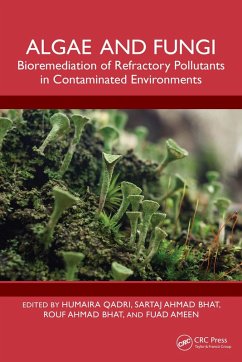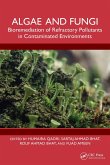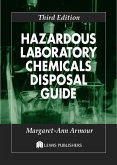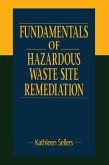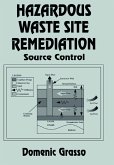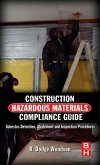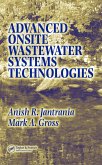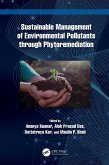Algae and Fungi (eBook, ePUB)
Bioremediation of Refractory Pollutants in Contaminated Environments
Redaktion: Qadri, Humaira; Ameen, Fuad; Ahmad Bhat, Rouf; Bhat, Sartaj Ahmad
125,95 €
125,95 €
inkl. MwSt.
Erscheint vor. 24.02.25

63 °P sammeln
125,95 €
Als Download kaufen

125,95 €
inkl. MwSt.
Erscheint vor. 24.02.25

63 °P sammeln
Jetzt verschenken
Alle Infos zum eBook verschenken
125,95 €
inkl. MwSt.
Erscheint vor. 24.02.25
Alle Infos zum eBook verschenken

63 °P sammeln
Unser Service für Vorbesteller - Ihr Vorteil ohne Risiko:
Sollten wir den Preis dieses Artikels vor dem Erscheinungsdatum senken, werden wir Ihnen den Artikel bei der Auslieferung automatisch zum günstigeren Preis berechnen.
Sollten wir den Preis dieses Artikels vor dem Erscheinungsdatum senken, werden wir Ihnen den Artikel bei der Auslieferung automatisch zum günstigeren Preis berechnen.
Algae and Fungi (eBook, ePUB)
Bioremediation of Refractory Pollutants in Contaminated Environments
Redaktion: Qadri, Humaira; Ameen, Fuad; Ahmad Bhat, Rouf; Bhat, Sartaj Ahmad
- Format: ePub
- Merkliste
- Auf die Merkliste
- Bewerten Bewerten
- Teilen
- Produkt teilen
- Produkterinnerung
- Produkterinnerung

Bitte loggen Sie sich zunächst in Ihr Kundenkonto ein oder registrieren Sie sich bei
bücher.de, um das eBook-Abo tolino select nutzen zu können.
Hier können Sie sich einloggen
Hier können Sie sich einloggen
Sie sind bereits eingeloggt. Klicken Sie auf 2. tolino select Abo, um fortzufahren.

Bitte loggen Sie sich zunächst in Ihr Kundenkonto ein oder registrieren Sie sich bei bücher.de, um das eBook-Abo tolino select nutzen zu können.
This book discusses algae/fungi as the tools for decontamination of the polluted environments and how the remediation techniques aid in biorefining the pollution in environmentally sustainable ways. It covers their applications in containing and controlling pollution including mechanisms of phyco- and myco-remediation.
- Geräte: eReader
- mit Kopierschutz
- eBook Hilfe
- Größe: 4.09MB
Andere Kunden interessierten sich auch für
![Algae and Fungi (eBook, PDF) Algae and Fungi (eBook, PDF)]() Algae and Fungi (eBook, PDF)125,95 €
Algae and Fungi (eBook, PDF)125,95 €![Hazardous Laboratory Chemicals Disposal Guide (eBook, ePUB) Hazardous Laboratory Chemicals Disposal Guide (eBook, ePUB)]() Margaret-Ann ArmourHazardous Laboratory Chemicals Disposal Guide (eBook, ePUB)223,95 €
Margaret-Ann ArmourHazardous Laboratory Chemicals Disposal Guide (eBook, ePUB)223,95 €![Fundamentals of Hazardous Waste Site Remediation (eBook, ePUB) Fundamentals of Hazardous Waste Site Remediation (eBook, ePUB)]() Kathleen SellersFundamentals of Hazardous Waste Site Remediation (eBook, ePUB)86,95 €
Kathleen SellersFundamentals of Hazardous Waste Site Remediation (eBook, ePUB)86,95 €![Hazardous Waste Site Remediation (eBook, ePUB) Hazardous Waste Site Remediation (eBook, ePUB)]() Domenic GrassoHazardous Waste Site Remediation (eBook, ePUB)181,95 €
Domenic GrassoHazardous Waste Site Remediation (eBook, ePUB)181,95 €![Construction Hazardous Materials Compliance Guide (eBook, ePUB) Construction Hazardous Materials Compliance Guide (eBook, ePUB)]() R. Dodge WoodsonConstruction Hazardous Materials Compliance Guide (eBook, ePUB)34,95 €
R. Dodge WoodsonConstruction Hazardous Materials Compliance Guide (eBook, ePUB)34,95 €![Advanced Onsite Wastewater Systems Technologies (eBook, ePUB) Advanced Onsite Wastewater Systems Technologies (eBook, ePUB)]() Anish R. JantraniaAdvanced Onsite Wastewater Systems Technologies (eBook, ePUB)64,95 €
Anish R. JantraniaAdvanced Onsite Wastewater Systems Technologies (eBook, ePUB)64,95 €![Sustainable Management of Environmental Pollutants through Phytoremediation (eBook, ePUB) Sustainable Management of Environmental Pollutants through Phytoremediation (eBook, ePUB)]() Sustainable Management of Environmental Pollutants through Phytoremediation (eBook, ePUB)88,95 €
Sustainable Management of Environmental Pollutants through Phytoremediation (eBook, ePUB)88,95 €-
-
-
This book discusses algae/fungi as the tools for decontamination of the polluted environments and how the remediation techniques aid in biorefining the pollution in environmentally sustainable ways. It covers their applications in containing and controlling pollution including mechanisms of phyco- and myco-remediation.
Dieser Download kann aus rechtlichen Gründen nur mit Rechnungsadresse in A, B, BG, CY, CZ, D, DK, EW, E, FIN, F, GR, HR, H, IRL, I, LT, L, LR, M, NL, PL, P, R, S, SLO, SK ausgeliefert werden.
Produktdetails
- Produktdetails
- Verlag: Taylor & Francis eBooks
- Erscheinungstermin: 24. Februar 2025
- Englisch
- ISBN-13: 9781040308820
- Artikelnr.: 72861629
- Verlag: Taylor & Francis eBooks
- Erscheinungstermin: 24. Februar 2025
- Englisch
- ISBN-13: 9781040308820
- Artikelnr.: 72861629
- Herstellerkennzeichnung Die Herstellerinformationen sind derzeit nicht verfügbar.
Humaira Qadri is heading the Department of Environmental Sciences in Govt. Degree College, Baramulla (Autonomous). She is also the Dean of Research in the college. She has also been actively involved in teaching the postgraduate students of environmental science for the past ten years in Sri Pratap College Campus, Cluster University Srinagar, J&K, India. She has also been heading the Department of Environment and Water Management of Sri Pratap College. A gold medallist at her master's level, she has bagged a number of awards and certificates of merit. Her specialization is in aquatic ecology and phytoremediation. She has published scores of papers in international journals and has more than 12 books with national and international publishers. She is also the reviewer of various international journals and is the principal investigator of some major projects on phytoremediation. She is guiding a number of research students for PhD programme and has supervised more than 60 master's dissertations. She also has been on the scientific board of various international conferences and holds life memberships in various international organizations. With a number of national scientific events to her credit, she is an active participant in national and international scientific events and has organized a number of conferences, as well as seminars of national and international repute. She is on the editorial board and the reviewer of various high¿impact journals. Sartaj Ahmad Bhat is working as JSPS postdoctoral researcher in the River Basin Research Center, Gifu University, Japan. He received his PhD in environmental sciences from Guru Nanak Dev University, Amritsar, India, in 2017. His primary research focuses on the development and evaluation of treatment technologies for solid waste and wastewater from domestic and industrial outlets, as well as organic waste recycling, with a focus on the biological and sustainable treatment by earthworms. He has published more than 50 research papers in peer¿reviewed journals, 3 books, and few book chapters to his credit. He is also an editor, editorial board member, and reviewer of many international reputed journals published by Frontiers, PLoS, De Gruyter, Springer, SAGE, MDPI, Elsevier, Wiley, and Taylor & Francis. Dr. Bhat is a recipient of several prestigious awards such as the JSPS Postdoctoral Fellowship to pursue research at River Basin Research Center, Gifu University, Japan, the Basic Scientific Research Fellowship (BSR JRF, SRF) by the University Grants Commission (UGC), India, the DST¿SERB National Postdoctoral Fellowship (CSIR¿NEERI, Nagpur, India), and Swachhta Saarthi Fellowship by the Govt. of India. He has also received the 2020 Outstanding Reviewer Award from the International Journal of Environmental Research and Public Health, MDPI (Basel, Switzerland), as well as Top Peer Reviewer 2019 in Environment and Ecology by Web of Science, and has more than 600 verified reviews and 60 editor records to his credit. Rouf Ahmad Bhat has pursued his doctorate at Sher¿e¿Kashmir University of Agricultural Sciences and Technology Kashmir (Division of Environmental Science). Dr. Bhat has been teaching graduate and postgraduate students of environmental sciences for the past three years. He is an author of more than 50 research articles (h¿index 21; i¿index 30; total citation >1200) and 40 book chapters and has published more than 30 books with international publishers (Springer, Elsevier, CRC Press, Taylor & Francis, Apple Academic Press, John Wiley, and IGI Global). He has his specialization in limnology, toxicology, phytochemistry, and phytoremediation. Dr. Bhat has presented and participated in numerous state, national, and international conferences, seminars, workshops, and symposiums. Besides, he has worked as an associate environmental expert in the World Bank¿funded Flood Recovery Project and also as the environmental support staff in the Asian Development Bank (ADB)¿funded development projects. He has received many awards, appreciation, and recognition for his services to the science of water testing, air, and noise analysis. He has served as editorial board member and reviewer of reputed international journals. Dr. Bhat is still writing and experimenting with diverse capacities of plants for use in aquatic pollution remediation. Fuad Ameen is an Associate Professor and researcher at the Department of Botany and Microbiology, College of Science, King Saud University, Riyadh, Saudi Arabia. He graduated his PhD in biodegradation of urban waste by mangrove fungi from King Saud University, Saudi Arabia. In addition, he has served as a researcher in different places in the field of biotechnology and applied microbiology. After that, he has been involved in many kinds of projects, many of them dealing with new solutions to treat the polluted sites. He has collected and studied microbial strains from arid and marine ecosystems indicating their ability to biodegrade the most common pollutants, and his programme of research on these organisms has taken him to many places and to examples of every major type of terrestrial and marine biöecosystems. He is the author or cöauthor of 150 papers and 15 book chapters in peer¿reviewed journals.
1. Environmental Pollution-An Upshot Of Development 2. Microbial
Bioremediation-A Sustainable Technique Of Pollution Abatement 3. Algae And
Fungi: Tools Of Pollution Indication 4. Fungal Diversity And Bioremediation
5. Green Algae Bioremediation 6. Role Of Algae In Diminishing Impacts Of
Air Pollution 7. Algae And Fungi In Soil Health Stability 8. Algae In The
Degradation Of Organic Pollutants 9. Biotechnological Potential Of Algae
And Fungi In Remediation Of Aquatic Systems 10. Fungi In The Remediation Of
Hazardous Chemicals 11. Bioremediation Of Wastewaters Using Algae And Fungi
12. Algae In The Remediation Of Biophilic Radionuclides 13. Advanced
Technological Approaches For Using Algae And Fungi For Bioremediation
Bioremediation-A Sustainable Technique Of Pollution Abatement 3. Algae And
Fungi: Tools Of Pollution Indication 4. Fungal Diversity And Bioremediation
5. Green Algae Bioremediation 6. Role Of Algae In Diminishing Impacts Of
Air Pollution 7. Algae And Fungi In Soil Health Stability 8. Algae In The
Degradation Of Organic Pollutants 9. Biotechnological Potential Of Algae
And Fungi In Remediation Of Aquatic Systems 10. Fungi In The Remediation Of
Hazardous Chemicals 11. Bioremediation Of Wastewaters Using Algae And Fungi
12. Algae In The Remediation Of Biophilic Radionuclides 13. Advanced
Technological Approaches For Using Algae And Fungi For Bioremediation
1. Environmental Pollution-An Upshot Of Development 2. Microbial
Bioremediation-A Sustainable Technique Of Pollution Abatement 3. Algae And
Fungi: Tools Of Pollution Indication 4. Fungal Diversity And Bioremediation
5. Green Algae Bioremediation 6. Role Of Algae In Diminishing Impacts Of
Air Pollution 7. Algae And Fungi In Soil Health Stability 8. Algae In The
Degradation Of Organic Pollutants 9. Biotechnological Potential Of Algae
And Fungi In Remediation Of Aquatic Systems 10. Fungi In The Remediation Of
Hazardous Chemicals 11. Bioremediation Of Wastewaters Using Algae And Fungi
12. Algae In The Remediation Of Biophilic Radionuclides 13. Advanced
Technological Approaches For Using Algae And Fungi For Bioremediation
Bioremediation-A Sustainable Technique Of Pollution Abatement 3. Algae And
Fungi: Tools Of Pollution Indication 4. Fungal Diversity And Bioremediation
5. Green Algae Bioremediation 6. Role Of Algae In Diminishing Impacts Of
Air Pollution 7. Algae And Fungi In Soil Health Stability 8. Algae In The
Degradation Of Organic Pollutants 9. Biotechnological Potential Of Algae
And Fungi In Remediation Of Aquatic Systems 10. Fungi In The Remediation Of
Hazardous Chemicals 11. Bioremediation Of Wastewaters Using Algae And Fungi
12. Algae In The Remediation Of Biophilic Radionuclides 13. Advanced
Technological Approaches For Using Algae And Fungi For Bioremediation
